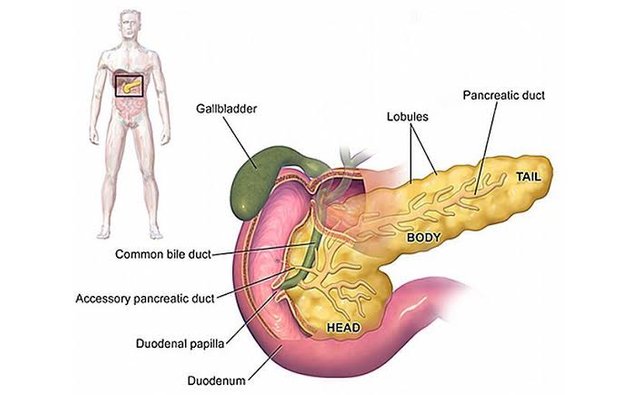New Scientific research :Artificial Pancreas For Treatment Of Type 1 Diabetes
The role of the pancreas
The pancreas is an organ in the body that secretes several hormones involved in various functions. Among such hormones is insulin, produced by beta cells ilets of Langerhands which is responsible for glucose uptake and storage by body cell among other functions.
What happens in diabetes mellitus
In diabetes mellitus, there is abnormality either in insulin production and release, or that of its function.
There are two basic types.
Type 1 results from absence of insulin, caused by destruction of pancreatic cells responsible for insulin production (beta cells) and is believed to be autoimmune mediated.
Type 2 is characterized by reduced insulin sensitivity (insulin resistance) with relatively increased insulin levels.
The patient with type 1 diabetes
As already said, people with type 1 diabetes lack the ability to produce insulin and as such depends on exogenous insulin for their sugar control. That's not all, these groups of patients usually have childhood onset of the symptoms and usually develop lots of complications from periodic high or low level of blood glucose outside normal range. They usually have low quality of life and eventually die young.
Various efforts at achieving euglycaemia
In the past, various efforts have been made to achieve normal glucose levels and such ranges from continuous glucose monitoring(CGM) to continuous insulin infusion (insulin pump). Either of these were with occasional rise and fall in glucose level outside the normal range and usually not convenient for the patient.
Researchers seeing these draw backs reasoned that it will be nice to have the system for continuous glucose monitoring linked to the infusion pump and this was put in place. But this was not without limitation as lots of conducting circuit were involved and patient mobility is affected. Patient also needs to keep adjusting the infusion pump depending on glucose levels, as well as factor in diet and exercise.
The artificial pancreas
Further advance was in developing an automated system that will mimic the function of the pancreas and where patients glucose can be appropriately monitored without much input from patient(s)
The artificial pancreas is a system that measures blood sugar levels using a continuous glucose monitor (CGM) and transmits this information to an insulin pump that calculates and releases the required amount of insulin into the body, just as the pancreas does in people without diabetes. Source.
The first break through to getting automatic glucose control was by medronics, through a minimed 670G, a hybrid system composed of an insulin pump, glucose sensor for continuous glucose monitoring and a glucose meter for calibrating the CGM. The patient loads the pump with a long acting insulin, sets basal glucose level as well as lower threshold for blood glucose. The sensor sends signals to the pump through a wireless connection. The pump automatically releases insulin based on the blood glucose level,switching the pumps off when nearing lower threshold , as well as increasing insulin release at high blood glucose.
The minimed got American FDA approval for commercial use in 2016, using glucose sensor as abdominal subcutaneous implant. However, it also got approval this year(February 2018) to make use of glucose sensor implanted under the arm for CGM. A patient using the Minimed 670G still has to manually deliver insulin during meals.
Artificial pancreas is for treatment of only type 1 diabetes, although it is believed to extend to type 2 diabetes in future.
And more research is even on going
Several other collaborations, companies and bodies from different parts of the world have been making efforts to improve upon the artificial pancreas and many of them have developed one, with diverse characteristics, but all aimed at having a more sensitive and accurate, better predictive sensor with improved algorithms and less demanding on the patient.
Such companies include Typezero technologies, Dexcom, Tandem Diabetes Care, Roche Diagnostics, Bigfoot Biomedical, Insulet(Omnipod) delivery systems, Animas and Beta Bionics.
.jpg)
source: Wikipediacommons.com
Few highlights from the various artificial pancreas on trial
Beta Bionics are developing artificial pancreas at Boston's Massachusetts General Hospital and it's proposed to have additional feature of being able to administer insulin and glucagon. The addition of glucagon will be based on patient's choice and will be particularly beneficial to people with hypoglycemic awareness.
The Bigfoot Biomedicals on the other hand promises a smart phone App, a more portable pump without a button or screen, and a sensor. The phone is proposed to use Bluetooth and the glucose sensor paired to the Bluetooth. The phone app will have a rechargeable battery and through it the pump can easily be manipulated. This means nutrition and exercise can easily be integrated with the phone. The pump will be in the patient's pocket and can run even when the phone is out of range.
Conclusions from available trials of artificial pancreas
Various trials carried out on artificial pancreas have all shown that it gives a better blood glucose control with fewer incidents of hypoglycemia, hyperglycemia and improved quality of life. One of such is the International Diabetes Closed Loop(IDCL) Trial led by the University of Virginia in conjunction with centers in Europe and various companies producing artificial pancreas. Many more trials are ongoing.
The future
Artificial pancreas hold hope for patients with type 1 diabetes. While not a cure, it ensures proper glucose control, reduce complications from outside the range blood glucose level. It reduces the burden of the disease as well as improve quality of life.
We expect several artificial pancreas options with different features but same aim in few years to come, while hoping that diabetes will in time find cure.
References
Medical Xpress:The artificial pancreas is a safe and effective treatment of type 1 diabetes
TCOYD: The artificial pancreas, what is it and when is it coming out?
Medical Xpress : First-generation 'artificial pancreas' brings hope for people with type 1 diabetes
.jpg)
